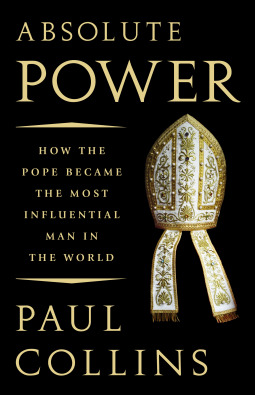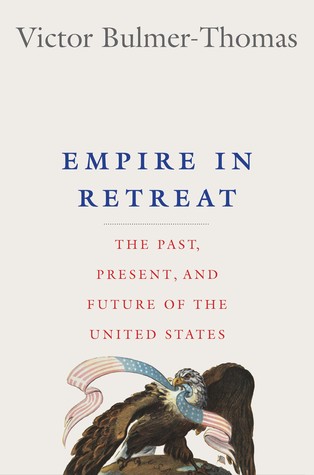Empire in Retreat: The Past, Present, and Future of the United States, by Victor Bulmer-Thomas (New Haven: Yale University Press; 480 pp., $32.50). This excellent and timely book is of great interest as informed speculation on the future of the United States; at a secondary level, it is a meditation on empire in history. Bulmer-Thomas, a specialist in the history of Latin America and the Caribbean and professor emeritus at the University of London, lived and taught in the U.S. for many years. The events of September 11, 2001, and America’s response to them, gave him the idea for this book. He begins by noting that, while most empires (for example, the British Empire) were brought down by external events, the American Empire is in retreat for internal reasons, the chief of them being that the American public no longer wishes to pay the price and bear the burdens of empire. Yet, Bulmer-Thomas reminds us, the U.S. is a product of an imperial age and indeed has been an empire herself since the Treaty of Paris in 1783, when she acquired a vast territory the 13 colonies had never controlled and one already populated by its native inhabitants. “Republic” and “empire” were at that time not considered contradictory terms. Since then, the nation became a continental empire with the Louisiana Purchase in 1803, next with the acquisition of Texas in 1845 and the subsequent Treaty of Guadalupe Hidalgo after the Mexican-American War. The conclusion to the Spanish-American War made her a territorial empire, and during the Cold War she became what the author calls a semiglobal empire, and the closest any nation has ever come to establishing a full global empire. Despite this history, however, Americans have never been comfortable with the notion of an American empire. And so, “To avoid the use of the word ‘empire’ [they] have developed an enormous lexicon of synonyms,” of which the most common is “exceptionalism”—an assertion that is also an apology. Bulmer-Thomas understands President Trump as a “neo-imperialist” who stresses the limitations of America’s capacity to act as the world’s leader and the necessity of working with nations that do not share the country’s “values.” He foresees the election of a “‘postimperial’ president,” a development he thinks could be a “very liberating experience for many Americans,” provided the reversion from an imperial to a simple nation state is handled competently and responsibly.

Absolute Power: How the Pope Became the Most Influential Man in the World, by Paul Collins (New York: Public Affairs; 384 pp., $28.00). The radical conceptual confusion from which this book suffers begins (but hardly ends) with its title. The Roman Catholic Church understands Herself as the Body of Christ and the Pope as Christ’s vicar, His representative on earth, the latest in a line of such vicars descending from St. Peter, himself appointed directly by Jesus Christ as the rock on which the Church (Christ’s Body) was founded. To ask therefore whether modern popes (since the communications revolution especially, Collins thinks) have “become” the most influential men in the world is the equivalent of asking if Christ Himself were the most influential man in the world during the 33 years He spent in it. The confusion is one of terms. Since Christ is True Man and True God, then clearly the answer is yes, still He is, as He once was, the most powerful and influential Being in the world. But the world in His own time did not recognize Him as either, though He was indeed Who He said He was, and His “influence” as the Second Person of the Trinity is eternally cosmic and universal; while that influence, like His Vicar’s, has increased as His teachings spread and His Church, under the guidance of the popes, has grown in numbers, in institutional size and strength, and naturally, therefore, in “influence.” But influence is no single thing; it is as numerous as the people and institutions who exert it, and respond favorably to it. It is true that modern communications have helped immeasurably to extend papal influence, a fact that Paul Collins—a priest who “resigned from active ministry due to a doctrinal dispute with the Vatican” over an earlier book of his, Papal Power—greatly resents, as he sees the Church since Vatican II as “a sect,” undeserving of so much positive publicity, rather than the pure Church Christ founded, which he seems to imagine as having been the Church of Garry Wills—another heretical Catholic who persists in identifying himself as among the faithful, as if being a Catholic were a subjective identity instead of an objective and theologically rigorous one.
On the other hand, I will agree with Father Collins that contemporary popes should never have allowed themselves to become or have been made celebrities, whether ecclesiastical or global ones; that a pope should travel little, be seen little, and be heard from chiefly at High Masses on the great feast days—and, indirectly, when he issues a papal document, such as a motu proprio or an encyclical. Such is the right and appropriate sort of “influence” exerted from where papal influence should begin: the Vatican. Here, reform is indeed needed. As for Father Collins’s other suggested reforms, among them democratizing the Roman Church and bringing Her into line with the mores and idols of Western secular (and profoundly anti-Catholic) modernity, I expect that he developed most of them during his time at Harvard, from which he holds an M.A. in theology.



Leave a Reply